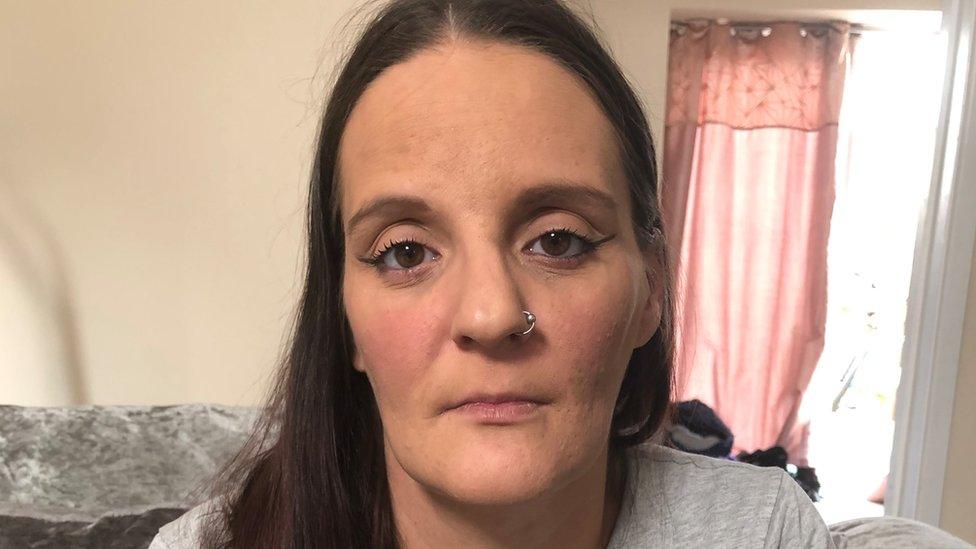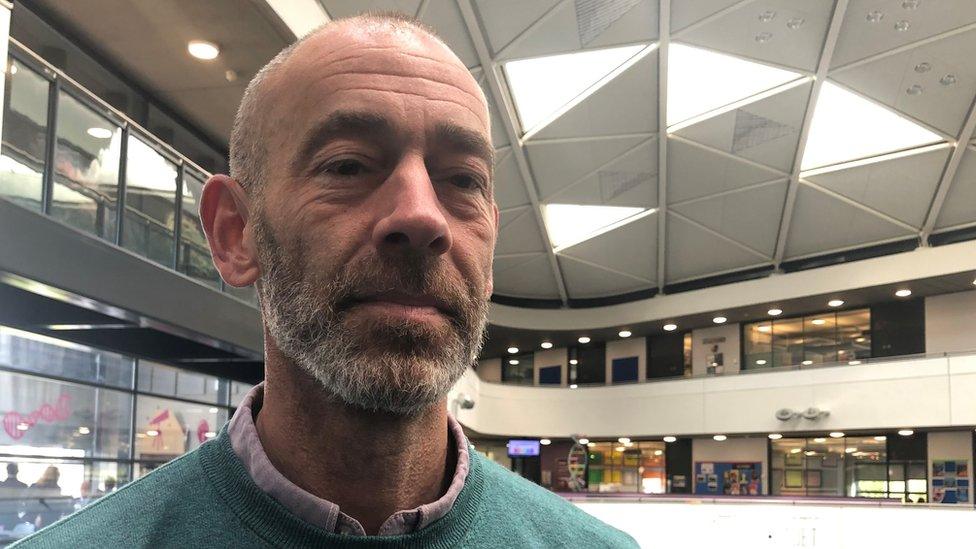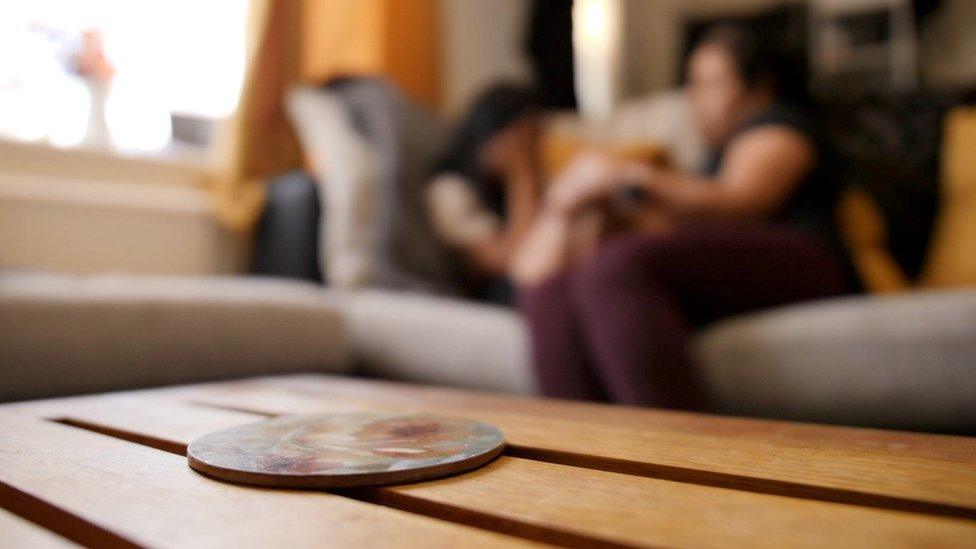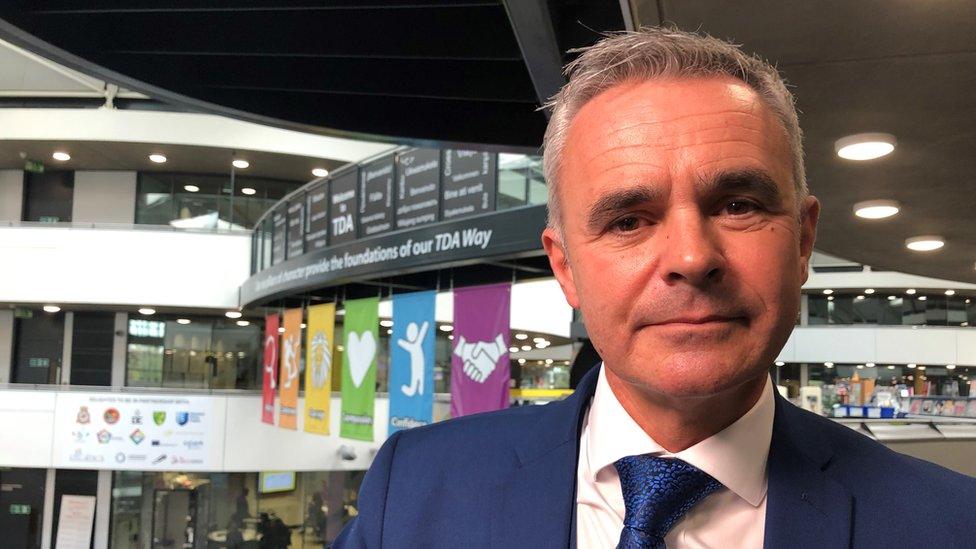Temporary accommodation: 'You don't know when you'll be told to go'
- Published

Nadine's children have to move schools each time the family moves
Nadine lives with her five children in a terrace house on a quiet street in Peterborough city centre. But it is not a place they can call home because they could be told to leave at any moment.
Nadine's children are among more than 5,000 in the East of England living in what is termed temporary accommodation, which can range from a private house, bed and breakfast or a hostel.
Every time Nadine moves, not only does it mean upheaval for her home life, it also means her children have to move schools.
"I find myself sometimes at my wit's end, struggling to keep the kids in some form of routine," she says.
"It is difficult to have a routine in such an unsecure and unknowing situation, where you are in temporary accommodation and don't know when you are going to receive a phone call saying 'it's time to go, it's time to move on'."
Nadine and her family have moved between three homes in the past three years
Nadine and her children have moved three times in three years.
"It's horrible," she says. "I sit there sometimes and think, as a mum, I should be able to have some consistency for them, which is either walking to school everyday, dropping them off myself.
"That is something I don't get to do now because they do have to have some form of transport to take them in because it is such a distance."
Her 13-year-old son says it is "difficult", adding: "It's pretty hard to make new friends."
The Light Project, a homelessness charity based in the Cambridgeshire city, has seen first hand the impact this type of situation has on families.
At the moment, there is no system to make sure schools are notified if their students are homeless, which means they may be travelling a long distance to get to lessons.
"We want to change the whole system. We want to make sure that any time a child or young person goes into temporary accommodation that the school is aware," says chief executive Steven Pettican, who believes permission should be sought from the parents.
"Then the school can do their excellent job and support that family."

Steven Pettican is calling for a national system to make sure schools are automatically informed if a child is living in temporary accommodation, with the permission of the parents
Only a few miles away, another family is in a similar situation. Andrea, not her real name, sleeps on the sofa with her husband, while her two children share a bedroom.
Her family are living out of boxes waiting for a permanent home. It is the third place they have lived in over the past two years.
"I say to my kids, 'let's take it as an adventure'," says Andrea.
"We are in the system... but I'm trying for them to not focus on that when they are thinking that we have to move again, I have to leave my friends behind."
Her 10-year-old daughter adds: "I'm just grateful for the house I have, I'm just grateful for the hostel.
"It's kind of making school hard but I just love to go to school, it's all I've ever wanted to do.
"At least I get some knowledge in my head, an education."

Andrea sleeps on the sofa with her husband
Andrea says she tries to stay positive but "it's hard to think".
"We don't know where we are going to end up and when we are going to move again."

Children living in temporary accommodation
Local authorities use a variety of accommodation as temporary housing for homeless households, which can include private sector or social housing, hostels or bed and breakfasts
There are 473 children living in temporary accommodation in Peterborough and 320 in the rest of Cambridgeshire
In England 119,840 children are living in temporary accommodation
Source: Government data


Rick Carroll says his school offers extra support to homeless students
At the city's Thomas Deacon Academy, principal Rick Carroll says an increasing number of students are living in temporary accommodation.
"What we wanted to do was to ensure that we were aware of when that happens because the moment that a family goes into that situation, there is a whole host of unknown stresses that if we are aware of it, we can support them," he says.
Mr Carroll says one effect on students has seen them arriving late because the temporary accommodation had moved further away, leaving the school needing to work with a parent to get a bus pass.
He says another challenge for homeless students is having access to the internet.
"Students who are in that situation will not be able to do their homework," he says.
"That could be seen as a negative in school, that could impact on their progress.
"We have reconditioned Department for Education (DfE) laptops and got them internet codes. So we take away just some parts of the stress and the difficulties that that family is dealing with."
The DfE said admission registers will contain the address where pupils live and that schools should encourage parents to inform them of any changes.
But councils state they will not always know whether an address is a temporary home.
A DfE spokesperson said: "Vulnerable children in schools, including those in care or with social workers, benefit from targeted additional funding and the support of a dedicated staff member in every local area to identify and champion their needs.
"We are also strengthening links between social care and education to keep these pupils engaged in school, ahead of widescale reform to the care system through our response to the independent review of children's social care."
Additional reporting by Phil Shepka

Find BBC News: East of England on Facebook, external, Instagram, external and Twitter, external. If you have a story suggestion email eastofenglandnews@bbc.co.uk, external